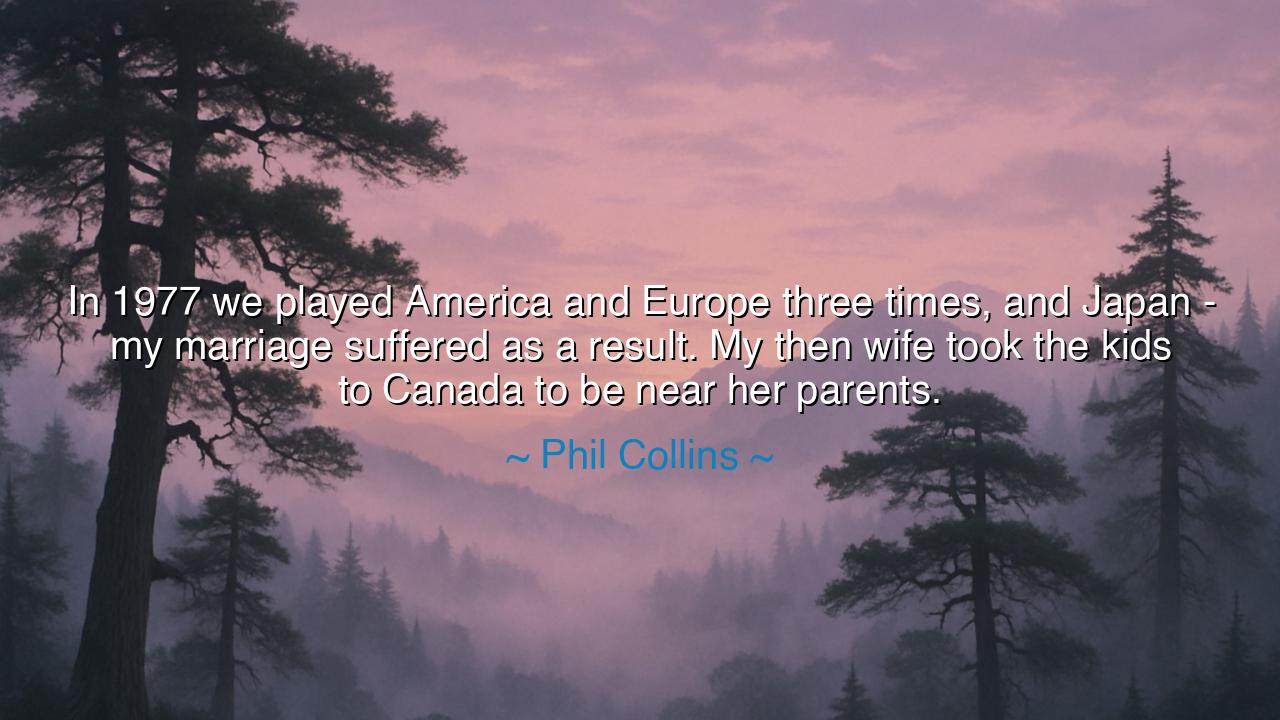
In 1977 we played America and Europe three times, and Japan - my
In 1977 we played America and Europe three times, and Japan - my marriage suffered as a result. My then wife took the kids to Canada to be near her parents.






"In 1977 we played America and Europe three times, and Japan — my marriage suffered as a result. My then wife took the kids to Canada to be near her parents." – Phil Collins
In these bittersweet and reflective words, Phil Collins, the legendary musician whose songs once echoed through the hearts of millions, reveals a truth that is as old as ambition itself. When he says, “My marriage suffered as a result,” he confesses not as a star, but as a man — torn between his devotion to art and his duty to love. His words are not an excuse, but a lament, a recognition that the pursuit of greatness often extracts a cost from the heart that no fame can repay. In the glitter of the stage lights, he glimpsed the shadow that follows every dream too fiercely pursued: the loneliness of success and the quiet collapse of the home.
The origin of this quote lies in the height of Collins’s career with Genesis, the rock band that conquered continents with sound and spectacle. In 1977, the band was unstoppable — touring the world, performing in America, Europe, and Japan, their music shaping the era. Yet, while the crowds roared and the applause thundered, another sound grew faint — the voice of family, the laughter of children, the intimacy of marriage. When his wife left for Canada with their children, it was not out of anger alone, but out of the slow erosion that comes when time and distance turn affection into absence. In his reflection, Collins reveals the eternal tension between art and love, between public triumph and private loss.
The ancients spoke often of this same dilemma. The philosopher Seneca once warned that those who chase glory must remember the price they pay in peace. Heroes and kings of old — from Alexander the Great to Julius Caesar — conquered the world but failed to conquer their own hearts. They built empires and monuments, but lost the warmth of companionship, the joy of shared life. Collins’s story, though set in the modern world of fame and music, carries the same timeless lesson: ambition must be tempered by balance, for a man who gains the world but loses his home is still a beggar at heart.
Consider also the tale of Tolstoy, the great Russian writer whose genius illuminated humanity but whose marriage endured years of strife. He, too, loved his work with divine intensity, yet that same fire often scorched those nearest him. In his journals, he wrote of the torment of being torn between the serenity of family and the restless pull of purpose. Like Collins, he learned that creation demands sacrifice, but that unchecked, it can devour the very love that once inspired it. From these lives we learn that greatness unbalanced becomes grief, and that the heart must always be the compass of one’s journey.
Collins’s confession is not one of bitterness but of wisdom born from loss. His words whisper a quiet truth to all who chase their dreams: that success without presence is emptiness. The stage may bring applause, but it cannot embrace you. The audience may adore you, but it cannot know you. A man who is everywhere may, in truth, be nowhere at all. His wife’s departure was not merely the end of a marriage, but the mirror that showed him the cost of forgetting that even love requires rehearsal — daily attention, daily devotion.
Yet within this sorrow lies redemption. For in admitting his failure, Collins offers others the chance to see what he once could not. He reminds us that time — the most precious of gifts — is also the most easily squandered. Work will wait; love will not. Children grow, hearts change, and moments lost cannot be reclaimed by apology or song. Thus, to balance one’s devotion to work and family is not a sign of weakness, but of wisdom. To say “enough” to ambition at times is to say “yes” to life itself.
So, my children of the striving heart, take this lesson to your days: pursue excellence, but not at the expense of affection. Let your art, your labor, your dreams enrich those you love, not replace them. The applause of the world fades quickly, but the laughter of family echoes through eternity. Share your time as you would share your song — freely, tenderly, without neglect. Remember that success built upon sacrifice of the soul will one day feel hollow, while a love nurtured amidst simplicity will forever be rich.
For as Phil Collins discovered through the ache of distance, no melody, no triumph, no acclaim can equal the quiet joy of being truly present with those who love you. In his loss, we hear an ageless truth: the world may cheer your name, but it is your family who speaks it with love. Guard that love, for it is the music that outlasts all others — the song that plays, even when the stage grows silent.






AAdministratorAdministrator
Welcome, honored guests. Please leave a comment, we will respond soon